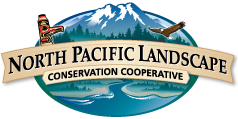Meeting Date: 2/3/2016
- 2/3/2016
Location: Anchorage, AK
Website: Website
Feb 3rd, Noon (AK)
Daniel Schindler, University of Washington, School of Aquatic and Fisheries Sciences
Abstract: Across river basins, there often exists substantial variation in thermal conditions of similarly-sized tributaries. This thermal variation is produced from local interactions between geomorphic conditions and hydrology which control stream thermal responses to meteorological forcing. Watershed attributes such as slope affect the residence time of water in a catchment and the degree of mixing with groundwater sources. Watershed elevation has important effects on stream temperatures because of the effects on snow accumulation durng winter that provides water to stream flows the following summer. We have found that streams draining steep watersheds are substantially colder during summer than those in flat watersheds, and that much fo this variation is correlated with the contributions of snowmelt to summer stream flows. Climate projections for western Alaska predict warmer temperatures and increased precipitation in all seasons, likely resulting in lower snowpack at low to intermediate elevations. How stream thermal regimes during the summer will respond to changes in snow accumulation are not understood. We will present data from intensive monitoring of summer water temperatures in >25 2nd-4th order streams in the Wood River basin over 5 years that exhibited informative differences in winter snowpack and summer meteorological conditions. Sensitivity of stream temperatures to meteorology was quantified with multivariate time-series models. The key result emerging from these efforts is that streams draining flat watersheds are most sensitive to short-term variation in meteorology (i.e., air temperature and irradiance) but that stream thermal regimes in steep, high elevation watersheds are likely to change the most in response to future climate warming if there are substantial reductions in winter snow accumulation. We will speculate about the consequences of these changes for fish and wildlife.
Join in Anchorage: Office of Subsistence Management Conference Room (2nd floor) USFWS Regional Office 1011 E. Tudor Rd.
Connect to the Webinar: 1. Go HERE 2. If requested, enter your name and email address. 3. If a password is required, enter the meeting password: WALcc!2016 4. Click "Join". 5. Call-in: 1-866-730-5871; access code: 111 111
